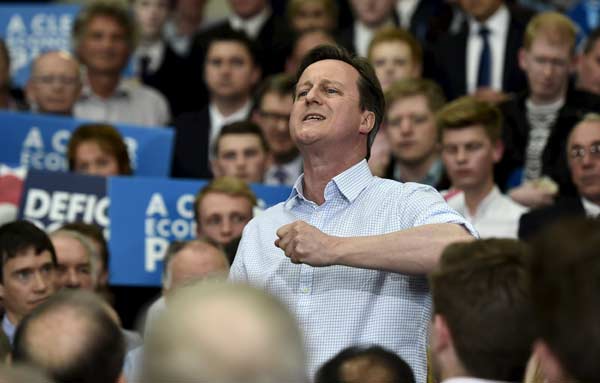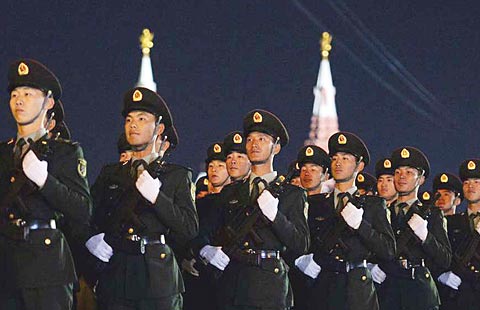
 |
|
Britain's Prime Minister David Cameron addresses party activists at a campaign rally in Carlisle in northern England May 6, 2015. [Photo/Agencies] |
'DISUNITED KINGDOM'
Of seven opinion polls released on the last day before voting, three showed the two main parties tied. Three put the Conservatives ahead by a single percentage point, and one gave Labour a two-point lead.
Leading pollster Peter Kellner of YouGov predicted the Conservatives would end up with 284 seats to Labour's 263, with the Scottish Nationalists on 48, Liberal Democrats 31, the anti-European Union UK Independence Party (UKIP) two, Greens one, and Welsh and Northern Irish parties 21.
If that proved correct, either of the two big parties would need support from at least two smaller ones in order to get laws through parliament.
If a durable government could not be formed, Britain could face political instability and even possibly a second election.
At heart, Britain's post-World War Two political consensus, which saw the Conservatives and Labour take turns in government, is crumbling as once marginal parties in Scotland and England steal millions of votes from established parties.
Scottish nationalists, who lost an independence vote last September, are likely to win the lion's share of seats in Scotland, capturing dozens from Labour, and making Miliband's chances of winning an overall majority much slimmer.
In England, UKIP has courted Conservative and Labour voters, but is likely to do most damage to Cameron's chances of a majority.
Cameron has warned that Miliband will only be able to rule with the help of the Scottish National Party (SNP), a result Cameron has warned could place the United Kingdom in peril.
Miliband has ruled out doing a deal with the nationalists, despite their overtures to form an alliance against the Conservatives.
"If we work together we can lock out the Tories. We will work with others across the United Kingdom, that is my pledge," SNP leader Nicola Sturgeon said in Edinburgh.
If Cameron fails to win a majority, he could try to strike a deal with the Liberal Democrats, a repeat of the 2010 coalition, and possibly also with Northern Irish unionists and UKIP.
Cameron has promised an in-out referendum on Britain's membership of the European Union by the end of 2017.
Polls open at 0600 GMT for the United Kingdom's 48 million voters and close at 2100 GMT. An exit poll will be published as soon as polls close, and most results are expected in the early hours of Friday.







